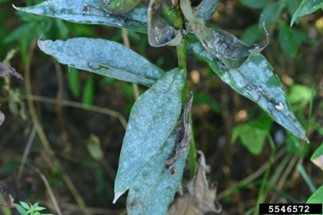Arkansas Plant Health Clinic Disease Notes
Contact
Plant Diagnostician
Phone: (479) 575-2727
Email: ssmith@uada.edu
Jason Pavel
Diagnostician
Phone: (479) 575-7257
Email: jpavel@uada.edu
Office:
University of Arkansas System Division of Agriculture
Cralley Warren Building
Room 16
2601 N. Young Ave.
Fayetteville, AR 72704
Phlox
Plant Health Clinic Disease Note Issue 21
Sherrie Smith and Jason Pavel

Phlox powdery Mildew- Erysiphe cichoracearum
Photo by David L. Clement, University of Maryland, Bugwood.org
Tall garden phlox, (Phlox paniculata and Phlox maculata) are lovely summer blooming perennials. They are available in a range of colors from pure white, orange, blue violet, through all the pink and magenta shades.
They have a long bloom period beginning in late spring to midsummer, depending on cultivar. Some varieties such as Carolina phlox Miss Lingard repeat bloom. Many have a sweet fragrance. They all make lovely long lasting cut flowers. Size ranges from 18 inches to nearly 3 feet tall.
They do best in rich moist soil in full sun. Unfortunately, some cultivars are very susceptible to Powdery Mildew, caused by the fungus Erysiphe cichoracearum. Symptoms are a powdery white-grayish film on the surface of the leaves.
Are there phlox varieties that are powdery mildew resistant?
As a rule, maculata varieties are more resistant than paniculata varieties. Nursery catalogs will often mention whether a given variety has resistance to powdery mildew. Phlox ‘David” has excellent powdery mildew resistance in a lovely white. ‘Franz Shubert’ in a lilac blue has good resistance also.
How do I treat powdery mildew?
For Powdery mildew, homeowners may use Fertilome Broad Spectrum Lawn and Garden Fungicide, (chlorothalonil), or Hi-Yield Vegetable, Flower, Fruit, and Ornamental Fungicide,(chlorothalonil) or Ortho Maxx Garden Disease Control, (chlorothalonil), or Garden Tech Daconil Fungicide, (chlorothalonil), or Bonide Fung-onil Multipurpose Fungicide, (chlorothalonil), or Spectracide Immunox Plus, (myclobutanil & permethrin), or Bonide Rose Rx Systemic Drench, (tebuconazole), or Bio Advanced Garden-Disease Control for Roses, Flowers, Shrubs, (tebuconazole), or Bio Advanced Garden-All-in-One Fungicide Insecticide Fertilizer, (tebuconazole & imidacloprid), or Fertilome 2-N-1 Systemic Fungicide, (tebuconazole & imidacloprid), or Bonide Infuse Systemic for Turf and Ornamentals, (thiophanate-methyl).
Take Aways:
- Choose resistant varieties.
- Begin fungicides at the first sign of powdery mildew on susceptible varieties.
Follow us on Facebook!
This work is supported by the Crop Protection and Pest Management Program [grant no. 2017-70006- 27279/project accession no. 1013890] from the USDA National Institute of Food and Agriculture.